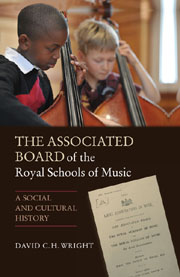Book contents
- Frontmatter
- Contents
- List of Illustrations
- List of Tables
- Dedication
- Preface
- List of Abbreviations
- Miscellaneous Conventions
- Introduction: The Context for a History
- I THE BACKGROUND
- II THE BOARD ESTABLISHED, 1889–1920
- III THE INSTITUTIONAL CULTURE, 1920–83
- IV THE BOARD REVIVED, 1983–2009
- 10 The Reconstitution, 1983–5
- 11 Reconnecting with its Market: the Smith Years, 1983–92
- 12 Redefining its Role: the Morris Years, 1993–2009
- Appendix 1 Speech and Drama Examinations
- Appendix 2 ABRSM Personalia, 1889–2010
- Select Bibliography
- Index
12 - Redefining its Role: the Morris Years, 1993–2009
from IV - THE BOARD REVIVED, 1983–2009
Published online by Cambridge University Press: 05 July 2013
- Frontmatter
- Contents
- List of Illustrations
- List of Tables
- Dedication
- Preface
- List of Abbreviations
- Miscellaneous Conventions
- Introduction: The Context for a History
- I THE BACKGROUND
- II THE BOARD ESTABLISHED, 1889–1920
- III THE INSTITUTIONAL CULTURE, 1920–83
- IV THE BOARD REVIVED, 1983–2009
- 10 The Reconstitution, 1983–5
- 11 Reconnecting with its Market: the Smith Years, 1983–92
- 12 Redefining its Role: the Morris Years, 1993–2009
- Appendix 1 Speech and Drama Examinations
- Appendix 2 ABRSM Personalia, 1889–2010
- Select Bibliography
- Index
Summary
Continuing themes
ONE of the problems in bringing the Board's institutional story into the present is the loss of a satisfactory historical perspective. Time's distance gives more of a chance to gain a handle on events, the better to evaluate and assess them for the positive or negative significance they might have as components of the Board's overall history. Clearly some of the initiatives that Richard Morris instigated in his time as Chief Executive have major implications for the Board's future, although it is too early to sense their impact. A good illustration is the decision of the ABRSM to invest in developing the Chinese market. The attractions of seeking to export grade exams to a country with some six million pianists are obvious enough, but the complexity of the process to be permitted to work there has represented a major challenge. It has taken considerable time and effort to gain a foothold, and it will be years before the outcome as a return on the investment of research and materials becomes clear. There is a further complication in writing about the recent institutional past, which is that commercial or other sensitivities sometimes preclude making anything other than tangential reference to source material. This account of the ABRSM in Morris's time is therefore more of a commentary on history-in-progress than a clear-cut interpretation arrived at from the comparative safety of a distanced perspective. Yet what is striking about this period is the extent to which its challenges correspond to those that have faced the ABRSM in the past, despite enormous differences in its circumstances.
- Type
- Chapter
- Information
- The Associated Board of the Royal Schools of MusicA Social and Cultural History, pp. 209 - 256Publisher: Boydell & BrewerPrint publication year: 2013



